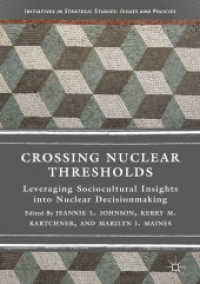- ホーム
- > 洋書
- > 英文書
- > Science / Mathematics
Full Description
This volume provides a broad and comprehensive overview of the many ways in which pragmatism has influenced contemporary debates in the philosophy of science.
Pragmatism has been undergoing a considerable revival in philosophical debates for the last two decades. Philosophers of science are now turning to pragmatism as a source of general insights and technical tools to address some of the thorniest problems of the discipline from a new and fresh perspective. This volume traces how pragmatism—in its classical and contemporary versions—serves as a useful toolbox for philosophers of science. It is divided into three thematic sections. The first section contains essays addressing topics belonging to the general philosophy of science. The second section features chapters that deal with themes and concepts from special sciences, ranging from natural sciences to sociology and from mathematics to religious studies. Finally, the third section analyzes the societal role of science and scientific activity.
Pragmatism and Philosophy of Science will appeal to scholars and advanced students working on philosophy of science, pragmatism, and history of philosophy.
Contents
Historical and Contemporary Perspectives on Pragmatism and Philosophy of Science Roberto Gronda, Marianne Janack and Giancarlo Marchetti Part 1: General Themes 1. Pattern Ontologies at Work Holly K. Andersen 2. Scientific Representation and Normative Inquiry Henrik Rydenfelt 3. Defending Pragmatist Quietism in the Realism/Instrumentalism Debate David Macarthur 4. Affective Rationalism and Pragmatic Philosophies of Science Matthew Crippen 5. Feynman Diagrams and Peircean Semiotics: A Study in Pragmatism Carmen Sánchez-Ovcharov and Mauricio Suárez Part 2: Special Sciences 6. Pragmatism and Mathematics Giovanni Maddalena and Fernando Zalamea 7. A Neopragmatist Intervention in Science Richard Healey 8. Pragmatism and Cognitive Science Pierre Steiner 9. A Pragmatist Philosophy of Economics Julian Reiss 10. On the Uses and Disadvantages of Social Science for Law Douglas Lind and Adrienne Holz 11. Interdisciplinary Environmental Science as Ethical Inquiry Zachary Piso 12. Theology as an Experimental Science: Some Pragmatic Considerations Michael Raposa Part 3: Science and Society 13. The Relevance of Pragmatism for an Open Science Approach Frank Miedema and Siebren Miedema 14. Democratizing Explanatory Practice in the Social Sciences Jeroen Van Bouwel 15. Trust, Expertise, and Scientific Authority in a Democracy: A Pragmatist Approach Matthew J. Brown 16. Thick Scientific Concepts and Public Problems: Citizens as Semantic Contributors Pierluigi Barrotta and Roberto Gronda 17. Pragmatism, Science, and Feminism: William James's Psychical Research Marianne Janack








